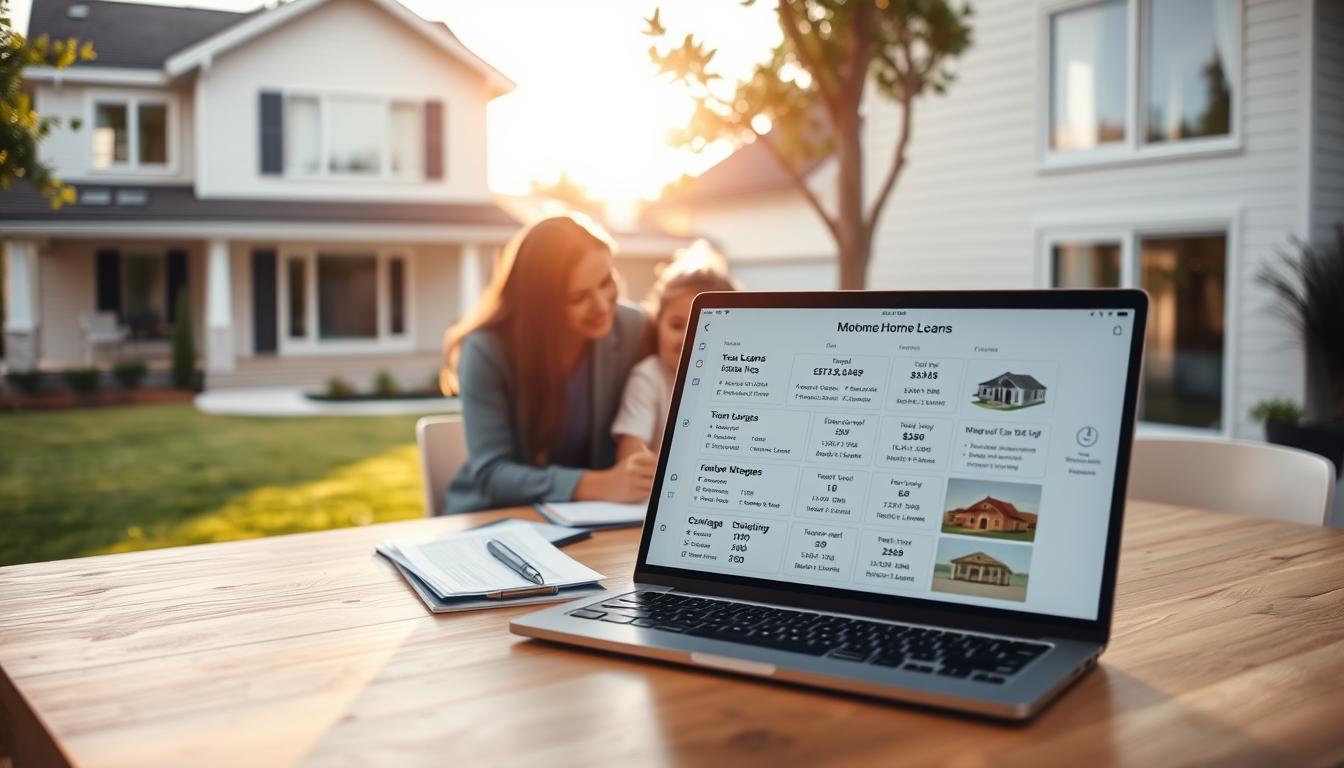Loans Near Me: Find the Best Lenders Quickly
Did you know personal loans can help with many financial needs? This includes unexpected medical bills or dream vacations. With so many lenders out there, finding the right one can feel overwhelming.
We know how crucial it is to find local loan options that meet your needs. Whether you’re searching for nearby loan services or looking for other options, we’re here to help.
Choosing the right lender can make getting the financing you need fast and easy. In this article, we’ll look at why local lenders are great. We’ll also share tips on how to get approved for a loan.
Key Takeaways
- Discover the benefits of using local loan options for your financial needs.
- Learn how to quickly find and compare nearby loan services.
- Understand the importance of choosing the right lender for your personal loan.
- Get tips on how to get approved for a loan efficiently.
- Explore the advantages of working with local lenders.
Understanding Local Loan Options
Local loan options are diverse and cater to various financial needs, making it essential to explore them thoroughly.
When we consider loan providers nearby, we open ourselves up to a range of choices that can be tailored to our specific financial situations.
Types of Loans Available Near Us
Local lenders offer a variety of loan types, including personal loans, debt consolidation loans, and home improvement loans, as reported by financial institutions like Wells Fargo.
These loans can be used for different purposes, such as financing a home renovation or consolidating debt.
For instance, personal loans can be used for various personal expenses, while debt consolidation loans help simplify our finances by combining multiple debts into one loan with a single interest rate.
Benefits of Choosing Local Lenders
Choosing local lenders can have several benefits, including competitive rates and personalized service.
Local lenders often have a better understanding of the local market and can offer more flexible terms.
They may also provide faster processing times and more direct communication, making the loan application process smoother.
How Local Loan Terms Differ
Local loan terms can differ significantly from those offered by larger financial institutions.
For example, local lenders may offer more competitive interest rates or more flexible repayment options.
The table below highlights some key differences between local loan terms and those offered by larger lenders.
| Loan Feature | Local Lenders | Larger Lenders |
|---|---|---|
| Interest Rates | Competitive, potentially lower | Generally standardized, may be higher |
| Repayment Terms | Flexible, potentially longer or shorter terms | Standardized terms, less flexibility |
| Processing Time | Faster, more personalized service | Longer processing times, less personalized |
By understanding these differences, we can make more informed decisions when choosing a lender and loan product that best suits our needs.
Assessing Our Financial Needs
Understanding our financial needs is the first step to getting the right loan. To get quick loan approval and urgent cash assistance, we must know our financial situation well.
Before we apply for a loan, we need to figure out how much we need to borrow. We also need to find out what type of loan is best for us. This means looking at our financial needs and finding the right loan.
Evaluating Loan Amounts and Terms
To evaluate loan amounts and terms, we should look at our income, expenses, and credit score. LendingTree says you usually need a stable income and a good credit score to qualify for a personal loan.
It’s important to understand the loan terms, like the interest rate, repayment period, and fees. Knowing this helps us make a smart choice when picking a loan from loan providers nearby.
Identifying the Right Type of Loan for Us
Finding the right loan type means thinking about our financial goals and situation. We need to decide if we need a short-term loan for quick needs or a long-term loan for big investments.
By looking at our financial needs and the different loans out there, we can make a good choice. This ensures we get the loan that fits our needs best. It helps us reach our financial goals smoothly.
Researching Lenders in Our Area
Looking into local lenders is key to knowing our loan choices. Whether it’s for a personal project, a business idea, or an urgent need, picking the right lender is crucial. It can greatly affect our financial situation.
How to Use Online Tools to Find Lenders
Online tools have made finding and comparing lenders easier. Sites like LendingTree and CNBC Select let us compare loans from different lenders. We can filter by loan amount, interest rate, and repayment terms.
To start, we just visit these websites, enter our loan needs, and see the matching lenders. This saves time and shows us more loan options in our area.
Reading Reviews and Ratings
After getting a list of lenders, we should read reviews and check ratings. Customer feedback can tell us about a lender’s reputation, service, and reliability.
We should look for lenders with high ratings and positive feedback. This could mean they’re known for quick approvals or flexible payments. But, we should avoid lenders with many negative reviews or low ratings.
Resources for Comparing Local Lenders
It’s important to compare local lenders to find the best deal. Online tools are just the start. We can also visit lenders’ websites to learn about their products and terms.
We can also talk to financial advisors or people who’ve gotten loans recently. Their experiences can give us practical advice and help us decide better.
| Lender | Interest Rate | Loan Terms | Customer Rating |
|---|---|---|---|
| Lender A | 6.5% | 5 years | 4.5/5 |
| Lender B | 7.0% | 3 years | 4.2/5 |
| Lender C | 6.0% | 7 years | 4.8/5 |
By following these steps and using the resources we have, we can research lenders in our area well. This way, we can find the best loan options for our needs.
Preparing for the Application Process
To ensure a smooth loan application, we need to be ready with the right documents and knowledge.
When applying for a personal loan, lenders ask for specific documents. These help verify our identity, income, and creditworthiness. Having these documents ready can make the application process easier.
Necessary Documentation We Should Gather
To apply for a personal loan, you’ll need to provide certain documents. According to Discover, having these documents ready can speed up the loan approval process.
- Identification documents (driver’s license, passport)
- Proof of income (pay stubs, W-2 forms)
- Bank statements
- Proof of residence (utility bills)
Having these documents ready can help us fill out the application quickly. This can lead to quick loan approval.
| Document Type | Purpose | Examples |
|---|---|---|
| Identification | Verify identity | Driver’s license, Passport |
| Income Proof | Assess repayment ability | Pay stubs, W-2 forms |
| Bank Statements | Evaluate financial stability | Recent bank statements |
Pre-Qualification vs. Pre-Approval Explained
It’s important to know the difference between pre-qualification and pre-approval. Pre-qualification gives an estimate of how much we might borrow based on our financial info.
“Pre-qualification is an informal agreement that doesn’t guarantee a loan, whereas pre-approval is a more formal agreement that involves a more thorough review of our creditworthiness.”
Pre-approval, on the other hand, is a formal agreement. It shows the lender is ready to lend us a specific amount, subject to certain conditions. Knowing these concepts helps us navigate the loan application process better. This way, we can find the best loan rates from loan providers nearby.
Understanding Interest Rates and Fees
When looking for loan providers nearby, it’s key to grasp interest rates and fees. These can change a lot between lenders, affecting our loan’s total cost.
SoFi says interest rates and fees can vary a lot. Knowing this helps us pick the best loan rates and avoid surprise costs.
Factors that Influence Loan Interest Rates
Several things affect the interest rates we get from loan providers nearby. These include:
- Our credit score and history
- The type of loan we’re applying for
- The loan term and amount
- Market conditions and economic indicators
Understanding these factors helps us find better interest rates.
Common Fees Associated with Local Loans
Local loans come with various fees, not just interest rates. These can be:
| Fee Type | Description | Typical Range |
|---|---|---|
| Origination Fee | Charged for processing the loan | 1% – 8% of the loan amount |
| Late Payment Fee | Applied when payments are missed or late | $25 – $50 per late payment |
| Prepayment Fee | Charged for paying off the loan early | Varies, often a percentage of the outstanding balance |
Knowing about these fees is vital when we need urgent cash assistance. It helps us understand the loan’s total cost.
By looking closely at interest rates and fees, we can make a smarter choice. This way, we get the best loan rates for our situation.
Exploring Government and Community Programs
Government and community programs help borrowers find local loan options. They offer support and assistance to those in need of financial help.
Local assistance programs make loans more accessible. They provide financial counseling, help with applications, and down payments.
Local Assistance Programs for Borrowers
Local programs are a great resource for borrowers. They come from community groups, non-profits, or government agencies. Services include:
- Financial education and counseling
- Assistance with loan applications and paperwork
- Down payment assistance
- Help with credit repair and credit scoring
“Government-backed loans, such as FHA and VA loans, offer favorable terms and conditions,” says a report by SoFi. This shows why it’s key to look into these options with local providers.
Understanding FHA and VA Loans
FHA and VA loans are government-backed with more lenient terms than conventional loans. FHA loans, insured by the Federal Housing Administration, are great for first-time buyers. They require lower down payments.
| Loan Type | Down Payment Requirement | Credit Score Requirement |
|---|---|---|
| FHA Loan | As low as 3.5% | 580+ |
| VA Loan | 0% for eligible veterans | Typically 580+, varies by lender |
| Conventional Loan | Typically 20% | 620+ |
VA loans, guaranteed by the Department of Veterans Affairs, offer great benefits to eligible veterans. They have zero down payment and lower interest rates.

Exploring government and community programs helps us understand local loan options. Whether through FHA, VA, or other programs, there are resources to help borrowers.
Navigating the Loan Application Process
To get the loan we need, we must first understand the application process and what lenders look for. The loan application process typically involves submitting an application and providing documentation, as noted by Wells Fargo. This initial step is crucial for a smooth and efficient experience.
Step-by-Step Guide to Applying for a Loan
Applying for a loan can be straightforward if we follow the right steps. Here’s a step-by-step guide to help us through the process:
- Research and compare loan providers nearby to find the best fit for our needs.
- Gather necessary documentation, including identification, income proof, and credit history.
- Submit our application, either online or in-person, depending on the lender’s requirements.
- Wait for the lender to review our application and verify the information provided.
By following these steps, we can ensure that our application is complete and accurate, increasing our chances of quick loan approval.
What to Expect During the Approval Process
Once we’ve submitted our application, the lender will review it and may request additional information. It’s essential to be prepared for this possibility to avoid delays. The approval process can vary depending on the lender and the type of loan we’re applying for. Some lenders offer same day loans, which can be helpful in urgent situations.
During the approval process, lenders typically assess our creditworthiness and verify the information provided. They may also check our income and employment history to ensure we can repay the loan. By understanding what to expect, we can better prepare ourselves for the process and reduce the likelihood of complications.
“The key to a successful loan application is preparation and understanding the lender’s requirements.”
In conclusion, navigating the loan application process requires knowledge and preparation. By following the steps outlined above and understanding what to expect during the approval process, we can increase our chances of securing the loan we need.
Managing Our Loans After Approval
After getting a loan, we start the real work: managing it well. It’s key to keep up with our finances to avoid trouble.
Managing our loans effectively means more than just paying on time. It’s about knowing our loan deal and making smart choices to keep our finances stable.
Strategies for Budgeting Loan Payments
To handle our loan payments well, we need a budget that includes our loan costs. LendingTree says, “Managing your loan after approval is key to avoiding trouble.” We should track our spending, sort our debts, and plan our income wisely.
Here are some tips:
- Put needs before wants to make sure we can pay our loans.
- Set up automatic payments to avoid missing payments.
- Think about combining debts if we have many loans with high interest.
As Forbes notes, “A budget is not just about cutting costs. It’s about making smart money choices that match our goals.”
Tips for Avoiding Default or Delinquency
To avoid default or delinquency, we need to be careful and take action. We should check our loan statements often and talk to our lender if we’re struggling.

Here are some important tips:
- Keep in touch with our lender to talk about any problems.
- Look into urgent cash assistance if we’re in a tough spot.
- Compare best loan rates to see if refinancing is a good idea.
“The key to successful loan management is proactive communication and a clear understanding of our financial obligations.”
By using these strategies and tips, we can manage our loans well and keep our finances healthy. It’s also smart to look at options from loan providers nearby for better services or rates.
Evaluating Our Experience and Next Steps
As we wrap up our search for the best loans near me, it’s key to look back and think about what’s next. Looking at our loan experience helps us make smart choices for the future. This could mean looking at new loan options or refinancing.
Assessing Our Loan Experience
Thinking about our loan journey means looking at the terms we got, the lender we picked, and the whole process. We should think if we were happy with the local loan choices and if the services met our hopes.
Future Loan Options or Refinancing
It’s important to think about our future loan plans or refinancing to reach our financial goals. We might look at other local loan options or change our current loan terms. This way, we can improve our financial plan and use the loan services to our advantage.
By reviewing our loan experience and looking at future options, we can make the most of the loans near me and local options.









